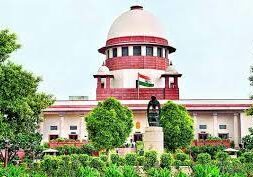
Manas Dasgupta
NEW DELHI, Aug 28: The Supreme Court on Monday expressed apprehension about the suspension of a lecturer in the education department of Jammu and Kashmir within days of his appearance before the apex court arguing against the abrogation of the article 370 in the erstwhile state.
It directed the Attorney General of India R. Venkataramani to find out from the J&K Lieutenant Governor Manoj Sinha and find out why Zahoor Ahmad Bhat, a senior political science lecturer with a law degree, was suspended within days after he appeared in court to argue against the scrapping of Article 370.
The court wanted to know if the suspension was linked to the lecturer’s appearance before the court and indicated it would take a dim view if this was the case suggesting it might be seen as “retribution.” Bhat on Wednesday last week had appeared before the five-judge Constitution bench of the Supreme Court led by Chief Justice DY Chandrachud hearing the abrogation of article 370 in the union territory and was suspended from the department on Friday with immediate effect through a letter issued by the J&K Education Department.
Bhat, who teaches Political Science at Government Higher Secondary School in Srinagar, was suspended with immediate effect for the violation of the provisions of J&K CSR, Jammu and Kashmir Government Employees (Conduct) Rules, 1971 and J&K Leave Rules. The order, issued by the Education Department’s Principal Secretary, said, “During the period of suspension, delinquent shall remain attached in the office of Directorate of School Education Jammu.”
The suspension was brought to the court’s notice by senior advocates Kapil Sibal and Rajiv Dhavan who said “the academic who came here and argued for a few minutes… was suspended on August 25. He took leave for two days, went back and was suspended. This is not the way our democracy functions. He appears in this court, files written submissions, the next day he is suspended,” they pointed out.
“Mr. Attorney General, please use your good offices to see what happened. Somebody who appears in this court is suspended. Talk to the Lieutenant Governor… If there is some other reason, apart from his appearance in this court, that’s different… But this suspension happens in close succession to his appearance before us… just see what happened,” Chief Justice of India D.Y. Chandrachud addressed the country’s top law officer R. Venkataramani.
Justice B. R. Gavai also questioned the Centre about the “close proximity” between Bhat’s appearance in court and the suspension order. “I have not seen the order, but the timing and the reference to this aspect [Mr. Bhat’s appearance in the Supreme Court in the Article 370 case]… If it is there, then there is a little problem,” Justice Sanjay Kishan Kaul joined in from the Bench.
Solicitor General Tushar Mehta, appearing for both the Union of India and the Jammu and Kashmir administration, said “there are other issues” leading to the suspension and everything in the newspapers “may not be the whole truth” about the affair. However, when the judges on the Constitution Bench, one after the other, voiced their scepticism about the suspiciously quick succession of events, Mr. Mehta admitted that the “timing was definitely not proper… I bow down… no argument.” He said he would ask the government officials concerned to look into it.
Bhat had appeared for himself and argued for five minutes. He told the court teaching Indian politics to students in Jammu and Kashmir had become more difficult since August 2019 – when the centre revoked Article 370 – as students ask him, ‘Are we still a democracy?” Bhat had argued that J&K had lost special status and been split into two union territories “in violation of the morality of Indian constitution. The move was against cooperate federalism and supremacy of the Constitution.”
Sibal said if there were “other issues” which prompted the suspension, the administration could have acted against him earlier. “Why wait till he appears in the Article 370 matter,” the senior advocate asked. “He was suspended from the faculty because he argued what he argued in the Article 370 matter… these things should not happen,” Mr. Sibal submitted.
During the proceedings Mehta highlighted that the Preamble of the Constitution of India was made applicable to J&K without the words ‘socialist’ and ‘secular.’ He also contended that following the abrogation, there has been an influx of investments and tourists in the valley.
The Chief Justice had earlier said the government cannot justify the “means” used to abrogate Article 370 from the Constitution and erase Jammu and Kashmir as a full-fledged State in August 2019 by simply pointing to the “ends” achieved.
The court was earlier apprised that the Union Government has no intention to interfere with the special provisions applicable to North Eastern states or other parts of India. The assurance was given following the apprehensions raised by advocate Manish Tewari about the implications of the abrogation on the prospects of States in the northeast.
On August 5, 2019, the Centre had announced ending of the special status to Jammu and Kashmir by abrogation of article 370 and bifurcate it into two Union Territories. Several petitions challenging the abrogation of the provisions of Article 370 and the Jammu and Kashmir Reorganisation Act, 2019, were referred to a Constitution Bench in 2019.














